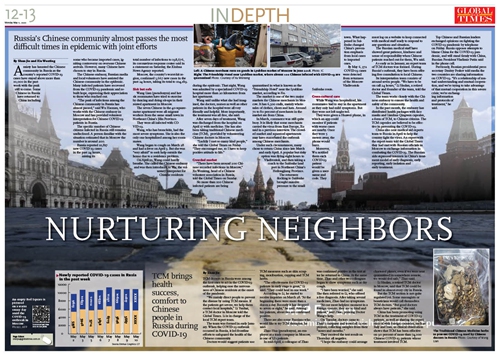Russia’s Chinese community weathers epidemic with mutual aid, joint efforts
By Shan Jie and Xie Wenting Source:Global Times Published: 2020/5/10 18:49:26
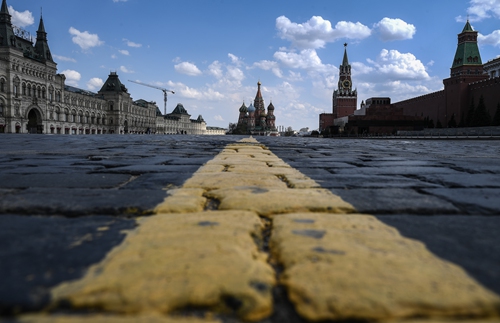
An empty Red Square is pictured on a warm sunny day amid the COVID-19 outbreak in Moscow. Photos: AFP
Anxiety has haunted the Chinese community in Russia as the country's reported COVID-19 cases have stayed above more than 10,000 in the past week with the peak still to come. Some Chinese in Russia have returned to China including some who became imported cases, igniting controversy on overseas Chinese arrivals. However, many Chinese have chosen to stay in Russia.
The Chinese embassy, Russian medical system and local volunteers have assisted the Chinese community in the epidemic. Many infected patients have recovered from the COVID-19 pandemic and rebuilt hope, expressing their appreciation to those who reached out.
"The peak of infections among the Chinese community in Russia has almost passed," said Wu Haonan, who works with the Chinese embassy in Moscow and has provided volunteer interpretation for Chinese COVID-19 patients in Russia.
The specific number of Chinese citizens infected in Russia still remains undisclosed. A person familiar with the situation estimated that in Moscow the number is around 200.
Russia reported 11,012 new COVID-19 cases in the past 24 hours, raising its total number of infections to 209,688, its coronavirus response center said in a statement on Sunday, the Xinhua News Agency reported.
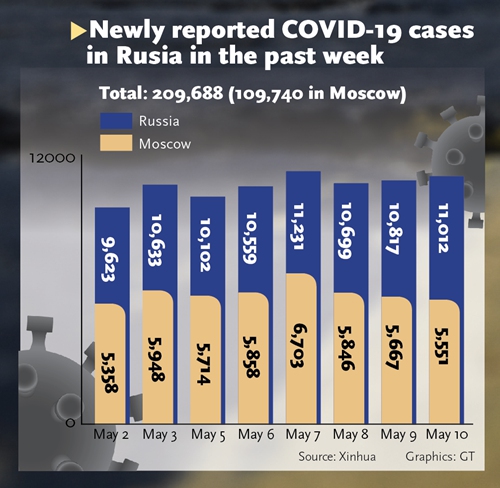
Graphic: IC
Moscow, the country's worst-hit region, confirmed 5,551 new cases in the past 24 hours, taking its total to 109,740. On Thursday, the Russian capital announced the lockdown of the city will be extended to May 31.
Sick but safe
Wang Lian (pseudonym) and her six roommates have tried to exercise by dancing and doing sit-ups in their rented apartment in Moscow.
The seven Chinese in the 40-square-meter apartment were all migrant workers from the same small town in Northeast China's Jilin Province.
They were all infected with COVID-19.
Wang, who has bronchitis, had the most severe symptoms. She is also the only one hospitalized among her roommates.
Wang began to cough on March 28 and had a fever on April 3.
But she was "very afraid" to seek help outside the house due to a residence problem.
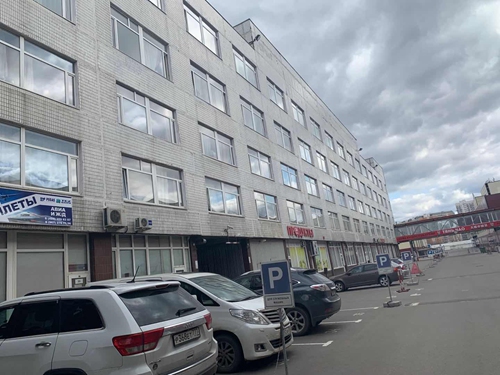
The Friendship Hotel near Lyublino market, where almost 100 Chinese infected with COVID-19 are quarantined Photo: Courtesy of Xu Wenteng
On April 10, Wang could hardly breathe. She called the Chinese embassy and was then introduced to Wu, the voluntary interpreter for Chinese residents during the epidemic. That night, Wang was admitted by a specialized COVID-19 hospital more than 20 kilometers from her apartment.
Wang said unlike what she had imagined, the doctors, nurses as well as other patients in the hospital were all very friendly and helpful. More importantly, the treatment was all free, she said.
After seven days of treatment, Wang was discharged from the hospital on April 17 with medicine. She has also been taking traditional Chinese medicine (TCM), provided by volunteering Chinese doctors in Moscow.
Wang, 41, has been in Russia for four years, working in multiple Chinese restaurants. Her three children live with their grandparents in Jilin.
Before the epidemic, her grandparents earned about 6,000 yuan a month. But with the closure of their business, they do not have any income.
"Some kind people paid our rent for the month," said Wang, adding she does not know if she could pay for next month. When she was first confirmed as infected, she cried every day.
"Luckily I met so many kind people," she told the Global Times on Friday. "They encouraged me, so I have to keep positive attitude to life."
"Now my biggest wish is to go back to China," she said.
Crowded market
Wang recalled her husband's co-worker, a porter at a Chinese market, might have been the source of her infection. The co-worker tested positive as soon as he returned to China in March.
"There have been around 200 Chinese recorded infections in Moscow," Xu Wenteng, head of a Chinese volunteer association in Russia, told the Global Times on Sunday.
The actual number has not been published officially. No more than 100 Chinese infected patients are being quarantined in what is known as the "Friendship Hotel" near the Lyublino market, according to Xu.
The market is one of the two major markets for Chinese merchants in Moscow. It has 6,500 stalls, mainly wholesales of clothes, shoes and hats. Around 70 to 80 percent of merchants in the market are from China.
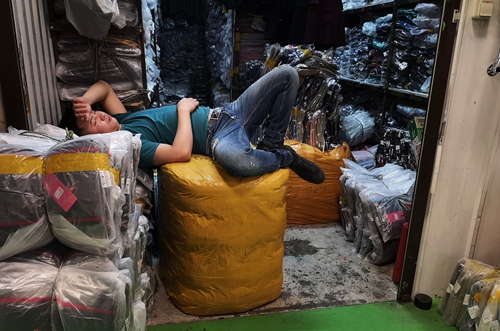
A Chinese merchant rests on goods in Lyublino market of Moscow in June 2018. Photo: IC
In March, commerce was still quite busy. It is likely that some merchants carried the virus from East Europe, Xu said in a previous interview. The crowded market and squeezed apartments may have exacerbated the outbreak among Chinese merchants.
Under such circumstances, many chose to return China since late March and early April. A popular but risky option was flying eight hours to Vladivostok, and then taking a coach to the Suifenhe land port in Northeast China's Heilongjiang Province.
The returnees flocking to Suifenhe brought massive pressure to the small town. What happened in Suifenhe changed China's prevention emphasis from local cases to imported ones.
By May 6, 372 COVID-19 cases were detected from returnees of the Moscow- Vladivostok-Suifenhe route.
On April 10, all land ports between China and Russia were temporarily closed, according to the Chinese embassy.
Cross-cultural care
While Wang was hospitalized, his roommates had to stay in the apartment as they only had mild symptoms. But they were not left neglected.
Residents in Wang's apartment were given a Huawei phone, in which an app could monitor if patients with worse cases are nearby. Once they were 5 meters away, the phone would buzz.
Moreover, Wu notified them each COVID-19 patient would be given a username and code. They must log on a website to keep connected with medical staff ready to respond to any questions and situation.
The Russian medical staff have showed great patience, kindness and sense of responsibility when Chinese patients reached out for them, Wu said.
As early as in January, an expert team of TCM doctors was formed. During Russia's outbreak, they have been offering free consultation to local Chinese residents.
Its interpretation team consists of around seven people. "We have to be on call 24 hours," Li Shulan, a retired doctor and founder of the team, told the Global Times.
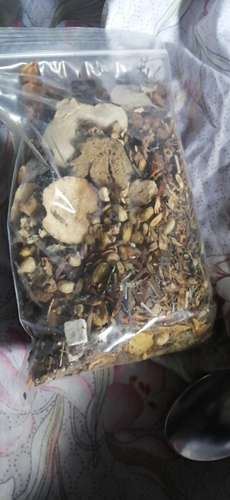
The Traditional Chinese Medicine herbs to prevent COVID-19 used by Chinese doctors in Russia Photo: Courtesy of Wang Lian
As some Chinese people there could not speak Russian, the interpreters have to serve as bridges between patients and doctors or nurses. They help the patients call medical institutes or ambulances and contact the Russian medical personnel. They often have to interpret each sentence of the doctors to the Chinese patient by phone.
Li and her teammates have built seven WeChat groups for Chinese residents in Russia contacting on COVID-19 issues— each with up to 500 members.
They wrote detailed directions and guidelines on handling COVID-19 in Russia, such as who to refer to and what to prepare before going to hospital. "You must know how to say 'hot water' in Russian. You might not be used to the food in hospital, but you must eat the buckwheat rice and soup as they are very nutritious," the direction reads.
The team works closely with the Chinese embassy to ensure the health and safety of the community.
In the past month, the embassy has distributed health packages with face masks and Lianhua Qingwen capsules, a form of TCM, to Chinese citizens. The TCM capsules are believed to be effective in preventing the COVID-19.
China also sent medical aid experts team to Russia in April to help the country fight the virus. An expert with the expert team told the Global Times they had met with Russian officials in Moscow to exchange information in combating the COVID-19. The Russian side expressed interests in China's treatment model of early diagnosis, early reporting, early isolation and early treatment. The team also brought TCM to Russia.
During their stay in Moscow, the expert said they witnessed Russian government step up efforts to protect its citizens by adding extra hospital beds and improving the general awareness of local citizens.
Top Chinese and Russian leaders exchanged opinions on fighting the COVID-19 pandemic by telephone on Friday. Russia opposes attempts to blame China for the COVID-19 pandemic, and will stand firmly with China, Russian President Vladimir Putin said in the phone call.
Previously, Russian presidential press secretary Dmitry Peskov told media the two countries are sharing information on COVID-19. "It's a relationship of mutual understanding and mutual cooperation, and we're trying to take advantage of that mutual cooperation in this severe crisis; we're exchanging information and protocols of treatment," he said.
